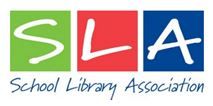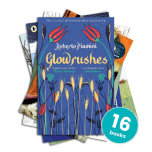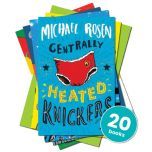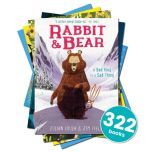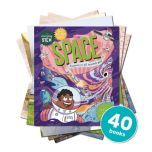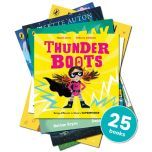Supporting Reading for Pleasure in Schools
Developing a reading-for-pleasure culture in our school communities requires more than encouraging children to pick up a book and read right now. While this is a fantastic and worthwhile starting point, the ripple effect of nurturing avid readers who choose to read, rather than read because they are told to, goes far beyond the here and now so a whole-school approach is most likely to be successful.
Children who read for fun are more likely to be happy and successful in life. (The Reading Agency, 2023)
The benefits of reading for pleasure for children (and adults!) are widely heralded and strongly supported by extensive studies, compelling statistics, and irrefutable research...
· Reading for pleasure is more important for children's cognitive development than their parents' level of education and is a more powerful factor in life achievement than socio-economic background. (Sullivan & Brown, 2013: Social Inequalities in Cognitive Scores at age 16: The Role of Reading)
· Reading extensively and for pleasure can foster the development of stronger reading habits and increase literacy skills at a greater rate than through formal literacy lessons. (Hilhorst et al., 2018: A Society of Readers)
· Children who have fun with reading are three times more likely to have good mental wellbeing compared with children who don’t enjoy reading. (National Literacy Trust, September 2018)
The Reading Framework (July 2023) consolidated the power of reading by acknowledging that “Extensive international research shows that being a frequent reader is associated with a range of academic, social and emotional benefits. Far more than pleasure is at stake.”
Despite the compelling evidence of its benefits, reading for pleasure hit its lowest point since the National Literacy Trust first asked the question in 2005: “Just 2 in 5 (43.4%) children and young people aged 8 to 18 said they enjoyed reading in their free time in 2023,” with a “26% decrease in the number of children and young people aged 8 to 18 who read daily in their free time since 2005.” This drop in reading enjoyment makes the call for creating reading for pleasure communities more urgent than ever.
Whilst it’s easy to recognise the value of cultivating a vibrant and thriving reading for pleasure community, creating one doesn’t always feel simple. Barriers such as lack of funding, heavy workloads, reading stigmas and battling digital distractions can seem like insurmountable obstacles. If only it were as simple as telling a reluctant reader to read for pleasure and having them do it! Magic wands aside, transformation lies in the strength of working together as a community, alongside the power of deciding to change and place reading at the heart of your school community. Say ‘yes!’ and be the one to take the first step, initiating small changes today toward creating a community where everyone is reading their way to a better future. Reading inspires curiosity, builds knowledge, enhances language skills, and fuels a love for lifelong learning — a virtuous cycle of growth that kindles an ever-increasing desire to read more. With a decline in recreational reading, it is “essential that schools plan systematically to nurture pupils’ desire to read. It cannot be left to chance.” (The Reading Framework, July 2023)
"The journey of a thousand miles begins with one step." (Lao Tzu.) Book by book, the power and magic of reading for pleasure can be unleashed. Below are some top tips for these first steps, so you can start building stories of success with reading for pleasure today…
· Make time for reading
The National Literacy Trust (UK) defines reading for pleasure as, “Reading we do of our own free will, anticipating the satisfaction we will get from the act of reading.” Reading for pleasure at school means children are freely and happily choosing and enjoying books they like. Reading for pleasure is not about being told or required to read, nor is it driven by academic obligation. Therefore, reading for pleasure is not possible if children are not allowed to choose their own books, not given regular opportunities to read independently, or are not given time to chat about books and reading.
Fostering a love of reading is a collective responsibility. To nurture a reading habit, it's crucial to create positive reading environments and encourage a supportive and enthusiastic attitude towards reading from an early age. This might include adults reading aloud regularly, informal book talk, reading recommendations from the adults and their peers, a scheduled daily time for reading, or access to books during breaktimes, in clubs, or before / after school.
Browse our Reading for Pleasure collections HERE to stock up on irresistible books that have been hand-picked by our primary school specialists as the most likely to get children into reading and keep them there.
· Foster an intrinsic motivation to read
“Schools that are determined to support all pupils to develop the habit of reading recognise intrinsic motivation is more closely associated with reading achievement than extrinsic motivation (reading for recognition, reward or to please others).” (The Reading Framework, July 2023)
Schools committed to fostering a reading culture among students acknowledge that pupils' motivation should stem from curiosity, recommendations, and engagement with characters rather than a desire to progress to the next level or earn certificates. While occasional rewards related to reading, such as book vouchers, can be beneficial, relying solely on external incentives may lead to a short-lived boost in motivation. Teachers should be cautious about evaluating comprehension through questions, as it can hinder the joy of reading and decrease motivation. Encouraging students to read more, without overly restricting choice, is crucial for developing a genuine love for reading and preventing potential feelings of embarrassment among peers.
· Small changes can make a big difference
By collectively fostering a culture of reading, one small step at a time, the entire school community can unleash a profound impact, demonstrating that even modest actions have the potential to make a substantial and positive difference in nurturing a community of enthusiastic readers. The collective effort of working collaboratively to transform reading for pleasure in schools is a formidable force, yielding enduring and achievable results far surpassing the impact of assigning this responsibility to a single individual!
There are numerous ideas for initiatives to help build the momentum of reading for pleasure throughout the school but it’s important that everyone feels part of this decision-making process and that new initiatives are given consensus and introduced gradually.
Here are some ideas to kickstart efforts in raising the profile of reading:
- Begin each day with ‘Morning Book Chat’. Spend the first ten minutes of every day discussing the books the children have read the night before.
- Keep a ‘Love Books Box’ in each classroom, containing a small, regularly refreshed, selection of books from the main library.
- Hold ‘Open Library Sessions’ at the end of each half term, inviting staff to browse the bookshelves and borrow books to read over the school holiday. As well as being a relaxing activity for the adults and expanding their repertoires of children’s literature, these books might then become recommendations for their class the following term. Keep libraries well stocked with the latest and best books for each year group with our Recommended Reads collections, for Reception to Year 6.
- Encourage children to leave ‘Post-It Note Reviews’, where they write on a sticky note how many marks they would give that book out of ten, along with one or two words to describe the book or their experience of reading it and then stick their review inside the front cover for the next person to view.
- Build ‘Transition Links’. Towards the end of the academic year, find out what the reading lists are for next year and introduce one or two of these books to the class. If possible, visit the next class for a story session or invite next year’s teacher in for a reading event or to share their current favourite read. Send four or five of the class’s favourite books up to the next class with them to read and share at the beginning of the year. Reception staff may choose to visit preschools in the summer term to read stories or invite their prospective pupils into school for a Bedtime Stories session in PJs, for example. Year 6 staff might also arrange or attend a Year 7 reading event.
- Set up fun ‘Holiday Reading Challenges’. You will find a range of engaging reading activities and challenges, including bookmarks, reading trackers and book review templates, in our FREE Downloads.
- Introduce ‘Poem of the Day’, where students sign up to recite poems individually or in small groups. This could initially be modelled by school staff to get it up and running and then become a short daily activity, providing an opportunity to raise the profile of poetry and broaden knowledge of poets, alongside the chance to perform and discuss poetry in a fun and pleasurable way. Browse our primary-aged poetry collections HERE, cherry-picked from the very best!
- Invite parents / carers to sign up to become a ‘Mystery Book’ reader. Send home a high-quality book, notebook and instructions, (in an opaque folder), inviting the adults to read the book and write a short comment about it in the exercise book, in secret! These books are revealed to the children at the end of the school year and added to the school library. Similarly, this idea could be carried out by the children in the class.
- Make space for a ‘Pupils Recommendations Shelf’ or ‘Your Teacher is Reading…’ in each classroom.
- Keep a class ‘Reading Scrapbook’, where students can contribute reflections and summaries, creating a shared record of the class’s literary journey. This scrapbook could be left in the class library for the next class to browse and add to, or follow the children to the year above to be shared with their next teacher.
- Start a ‘Reading Buddies’ programme, where Y5 / Y6 children spend time reading to / with pupils in Reception / Y1.
- If you do have budget that can be allocated to reading, why not organise an author / illustrator / poet event (and invite parents in too!) Hosting an author event is not only educationally enriching, it’s a lot of fun and can create memorable experiences that last a lifetime.
Importantly, you don’t have to do everything all at once! Get others on board and start by picking one or two things to try or adapt, working towards strengthening a resilient reading community.
· Be reading role models
Create an environment where reading is not just a task but an exciting adventure. Let children see you read. Make time to read books from the school/class library so you can recommend books to children that you know they will love. Most children will be moved and motivated to read if it’s a book that has been chosen especially for them, and because it’s been selected to match their interests, they are more likely to enjoy reading it.
Read aloud to children every day! You could enjoy sharing books in a planned daily story time session or become a pro at utilising that spare five minutes before lunch or reading as a brain break in lessons.
As role models and influencers, school staff have the opportunity to build solid foundations for a love of books and broaden reading appetites. Make it a habit to chat with your pupils about their interests and reading routines as part of your everyday interactions.
· Connect as a reading community
“Nearly three times as many children and young people who perceived their reading environment to be supportive said they enjoyed reading compared with those who perceived it to be less supportive (63.9% vs. 25.4%), while twice as many read daily in their free time (41.7% vs. 17.7%)” (National Literacy Trust, September 2023)
Collaborating with local organisations such as libraries, bookstores and community centres can help to create a culture of reading in the community. Involve the entire school staff, children’s families, parent-teacher associations and the local community in educational activities, fundraising, and reading engagement to boost reading enjoyment. For example, arrange a visit to the local library or invite a member of the local library service into school to give a talk. Send information home to parents about joining the library, reassure them about potential barriers such as late fees, and inform them about currently running events. Alternatively, signpost families to helpful websites, such as Book Trust and National Literacy Trust, which provide tips for reluctant readers, activities to do with your child at home, a book finder and tips for reading with your child.
Read our blog about Parental Engagement — Reading at Home for more top tips and ideas, including a free downloadable leaflet for parents and carers to give them ideas and inspiration on how to get started or improve their experiences of sharing books at home. Download our free PDF leaflet, which can be printed and sent home in book bags or attached to emails and sent to parents directly. Or download our free PowerPoint presentation, Reading for Pleasure at Home, to share with parents/carers of students from Reception to Year 6. This inspiring, ten-minute, parent-friendly presentation can easily be delivered by school librarians, teachers or teaching assistants to help build bonds as a community of readers. Use this PowerPoint to raise the profile of reading, provide realistic, practical tips for sharing books at home, and embed a collective reading-for-pleasure culture within your school community.
· High-quality books make a difference
Engaging, high-quality books that reflect the school community is crucial. Children will not pick up a book at all, let alone read it, if they are presented with tatty, dated books that don’t interest them. Research conducted by the National Literacy Trust (2018) found that “the main reason for not using the library was that it doesn’t have interesting reading materials.”
A good place to start when revitalising your bookshelves is to look at your current stock. “Every book must be worth reading or help pupils to put in the reading miles. Books that are unlikely to achieve either of these aims should be discarded.” The Reading Framework (July 2023) By completing an audit of your current stock and weeding out books that don’t meet these criteria, you give space for your high-quality books to shine, creating a safe, inviting space filled with enticing literary treats. It’s better to have fewer high-quality books on the shelves than hundreds of books that may send the wrong message. Download our comprehensive action plan: Inspirational Libraries a Foundation for Success to get the ball rolling!
“Pupils must be offered a feast of books: easy reads, books about how things work, graphic novels, joke books, irreverent books, books about animals – anything that might hook them into reading – as well as the more challenging books they will listen to in story times and study in English lessons. For some pupils, the hook into reading may be nonfiction, for example, a book on climate change recommended by a science teacher. Importantly, they need to be offered books they might choose to read over and over again.” The Reading Framework (July 2023)
Investing in high-quality literature can be time-consuming and costly. Badger Learning has an experienced team that reads and reviews hundreds of new books every year, searching for the latest high-quality reads, so only the best of the best make it into our book collections. They do this work, so you don’t have to! Instead, use the time you’ve saved to read and enjoy the books in these outstanding collections. Discover more about the work they do to Uncover the Secrets of a High-Quality Text or browse our Library and Reading Box collections to start cultivating your library today!
Access to high-quality books at the right level is crucial to building on the foundations of learning to read, so children can find the books they will love to read whilst developing fluency. Children need to discover books that will captivate them again and again, creating readers for life. Badger Learning provides over 90 carefully levelled Banded Book Collections, enabling schools to easily source books that meet the needs of individual readers, bringing variety and breadth to children’s reading diets and helping them get the most out of reading for pleasure. In addition to discounted RRPs, you will find a range of mini-banded packs to whole school library collections and everything in between — catering to every budget and need.
· Address diversity
Children need access to a wide range of engaging diverse texts so that every reader browsing those bookshelves can find books with characters and storylines that interest and speak to them. “Emotional engagement is the tipping point between leaping into the reading life or remaining in a childhood bog where reading is endured only as a means to other ends.” (Maryanne Wolfe, 2008) Ensuring children feel represented and included in the books they read not only fosters positive attitudes towards books and reading but also promotes the value of diverse voices and experiences, different to their own.
These Diversity in Fiction collections from Badger Leaning have been carefully selected to help schools ensure that their pupils have access to brilliant books with characters, authors, and storylines that reflect the diverse society we live in.
· Champion digital reading
All reading experiences and preferences need to be valued and respected when developing a positive reading-for-pleasure culture. Rather than battling against the rise of screen use, champion digital platforms as part of a broad and blended reading experience. Tap into digital reading as a ‘way in’ for those who love technology, gaming or spending time watching TV, for example. Digital reading might include watching TV with the subtitles on, reading a book of the film, listening to audiobooks or choosing an eBook — all of these choices encourage reading and might light the spark that ignites a lifelong love of reading, in all its forms.
Badger Learning have a wide range of eBooks to choose from, including very low reading-age books to suit EAL pupils or struggling readers, which can be hard to source. Other benefits of eBooks include that they are readily shareable, they can be loaded onto your school VLE and sent home to share on any device that accepts PDFs.
· Celebrate success
Sharing success stories in promoting reading for pleasure builds a sense of community and promotes a positive atmosphere where individuals feel valued, and teamwork and collective achievement are celebrated. A supportive reading culture can motivate children to try new approaches and perhaps take part in a reading activity they haven’t tried or been interested in before.
Examples of actions which could lead to success stories might include setting up a reading buddies programme where older students are paired with younger pupils to read and share books together, arranging an author visit, establishing a book club, creating reading corners, holding a family reading event, or hosting assemblies to celebrate reading achievements.
Why not read this inspirational case study by Jon Biddle: “Reading for Pleasure at Moorlands Primary Academy”, which can be found as part of our free download: “Inspirational Libraries a Foundation for Success.” Here is a short extract to set the scene…
“A few years ago, Moorlands was in quite a vulnerable position. There had been a couple of disappointing Ofsted inspections, a few years of underwhelming SATS results and a succession of interim headteachers. We realised that the staff, pupils and local community needed something to rally round in order to give the school a focus and we agreed that it was going to be Reading for Pleasure. After having explored the research, we understood the impact it could have, not just on the school’s data but, far more importantly, on the life chances of the children we teach.”
Click HERE to download the full report, track Jon’s progress and find out how this story ends!
· Leave nothing to chance!
Success cannot be left to chance and small changes can be lost if they don’t follow a clear direction or are part of a bigger picture. Developing a strategic approach and planning activities to promote reading based around core strategies and a whole school vision will maximise impact and outcomes. A great place to start is by putting a vibrant school library at the heart of your school development plan. Download Badger Learning’s free PowerPoint and action plan: ‘Inspirational Libraries: A Foundation for Success’ to develop a clear vision for the future of reading in your school library. This resource includes a presentation to get senior leaders and staff on board and a comprehensive action plan to start the ball rolling. You will find inspiration, support, and ideas to guide your library transformation and help to engage with key stakeholders, including staff, students, parents, and the wider community to gather perceptions and feedback that can guide what the library’s potential could be.
Progress may also require creative thinking to overcome barriers. School librarians, for example, play a pivotal role in the success of a thriving library that goes far beyond managing books and resources. However, their role is sadly often seen as a luxury that many schools cannot afford. Alternative solutions might include sharing a librarian among an academy chain of schools, amending the role of a teaching assistant, or utilising the support of parent volunteers or community members with library expertise.
· Resources & Support
Explore resources from charities and organisations dedicated to promoting literacy and reading for pleasure. They offer invaluable tools and guidance to create a vibrant reading culture in your school.
Badger Learning: educational book supplier and publisher, offering an extensive range of book collections, bookish blogs and free downloadable reading and library resources.
The Open University: free course — Developing Reading for Pleasure: engaging young readers.
National Literacy Trust: provides research, reading programmes for children and their families, partnerships with schools and a range of resources and support for educators.
Book Trust: provides a range of resources and support dedicated to get children reading.
The Centre for Literacy in Primary Education: CLPE provides resources and support for schools and libraries to encourage and promote literacy learning.
The Reading Agency: promotes the benefits of reading and offers a range of resources for schools and libraries.
The School Library Association: for advice, guidance and resources in developing your school library.
Chartered Institute of Library and Information Professionals: Joining CILIP can provide access to valuable resources, training, and networking opportunities for primary school libraries.







